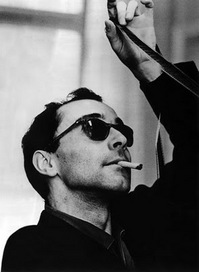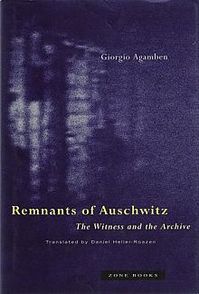Philip Watts, Associate Professor of French, Department Chair, Columbia University
Thoughts on Giorgio Agamben's Remnants of Auschwitz: The Witness and the Archive
Jeffrey Mehlman, Professor of French, Department of Romance Studies, College of Arts and Sciences, Boston University
Wednesday, April 13
4:00 p.m.
Humphrey Forum, Humphrey Center
Godard's Wars
 There has been much controversy about French filmmaker Jean-Luc Godard's relation to the Jews and the Holocaust. Godard was recently accused of anti-Semitism. Philip Watts will return to this recent affair by focusing on Godard's filmic representation of WWII, the Middle East conflict and the Holocaust.
There has been much controversy about French filmmaker Jean-Luc Godard's relation to the Jews and the Holocaust. Godard was recently accused of anti-Semitism. Philip Watts will return to this recent affair by focusing on Godard's filmic representation of WWII, the Middle East conflict and the Holocaust.How has the Holocaust figured in Godard's films since his earliest days as a filmmaker of the New Wave? What role has the memory of the Holocaust played in Godard's radical politics? What is the relation between the representation of the Holocaust in his films and his anti-Zionism? Do Godard's films somehow distort the memory of the Holocaust? Watts will tackle these questions by revisiting three Godard's films: "A Married Woman" (1964), "Ici et ailleurs" (1975) and "In Praise of Love "(2001) to examine Godard's problematic construction of the memory of the Second World War and of the Holocaust in particular.
Philip Watts, Associate Professor of French, Department Chair, Columbia University, received his BA at the University of California, Santa Barbara in 1982 and his PhD from Columbia University in 1991. His research and teaching focuses on 20th-century French literature and film and the relation between politics and aesthetics.
Thoughts on Giorgio Agamben's Remnants of Auschwitz: The Witness and the Archive
Italian philosopher Giorgio Agamben has argued in several books that the concentration camp has become the paradigm of our life in modern, liberal democracies. His work has a vast influence on many different fields and disciplines: legal scholarship, social sciences (especially political science), and literary studies in the US, Europe and beyond.

Jeffrey Mehlman will examine the perils engaged and not always avoided when Italy's pre-eminent philosopher, perched between Heidegger and Benjamin, Foucault and Arendt, hurls the pre-eminent discourses of European modernity at the pre-eminent catastrophe of the twentieth century in what never quite coheres as the pre-eminent epistemological encounter of modern times.
Jeffrey Mehlman, Professor of French, Department of Romance Studies, College of Arts and Sciences, Boston University is a literary critic and a historian of ideas. Over a number of years, he has been writing an implicit history of speculative interpretation in France in the form of a series of readings of canonical literary works.
Thoughts on Giorgio Agamben's Remnants of Auschwitz: The Witness and the Archive(Scribd.com)
Co-sponsored by: Department of History, Human Rights Program, Department of German, Scandinavian & Dutch, Cultural Studies & Comparative Literature, and the Department of French and Italian.